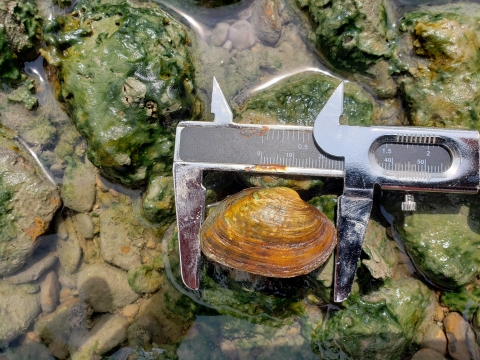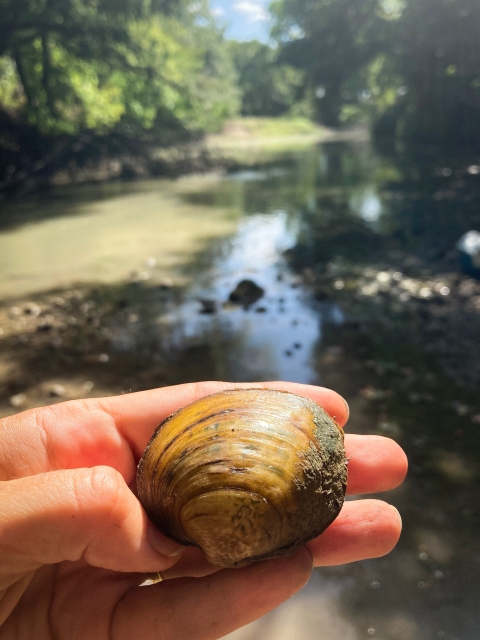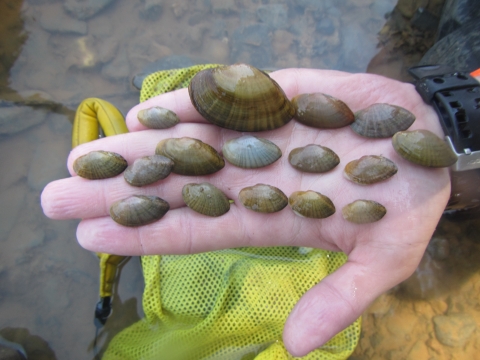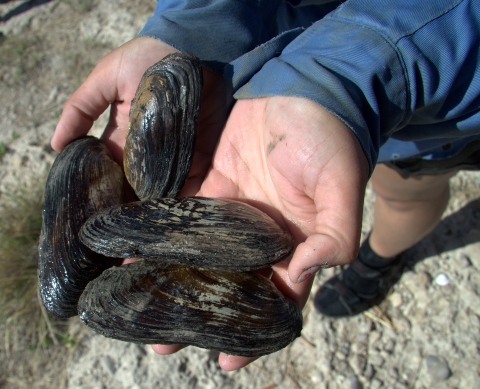Texas is known for many things – its size, stunning vistas, hot weather, and barbeque just to name a few. But did you know the Lone Star State is home to over 50 species of native freshwater mussels?
Sometimes referred to as the “livers of the river,” freshwater mussels are the cornerstones of clean water. A single mussel can filter up to 15 gallons of water each day! The work we do conserving Texas mussels is critical to ensuring clean water and healthy ecosystems for people, plants and wildlife. Protecting mussels protects the rivers and streams we all need.
Unfortunately, many of these native mussel species are declining due to habitat loss, declines in water quality, changes in stream flow rates, and major impoundments (dams).
Climate change is expected to make these threats worse with high water temperatures and more frequent droughts and floods.
Yet there’s still hope through science, partnerships, and the public – that's you!
You might think the names of such important specimens may be a little... dry. Well, we’ hope you’re not too shell shocked to learn freshwater mussels have some of the wackiest names of any animal.
Decide for yourself below which silly name best fits your personality ... and how to help our freshwater friends!
Texas Fatmucket
The female Texas fatmucket spends her early spring days fishing for a host fish, often a Texas native Guadalupe bass or sunfish. The female fatmuckets produce an elaborate fishing lure that looks just like a minnow!
Anglers, does this sound like someone you know?
False Spike
The false spike is found exclusively in the Guadalupe River basin – nowhere else on Earth! Assumed extinct until a handful were rediscovered in 2011, spotting this elusive freshwater mussel species is a rare and special experience.
Do you know someone who’s always hard to get a hold of? False spike ought to be their new nickname.
Texas Pimpleback
Isn’t it ironic? Texas pimplebacks typically don’t have any bumps on their shells. That’s why scientists named them pimplebacks. Makes sense ... right?
If you’re a jokester who lives for irony, you’d be a Texas pimpleback.
Texas Fawnsfoot
Truth or deer? If you put two of these mussels side by side, they oddly resemble the hooves of a white-tailed deer. It’s true!
Bambi lovers and gentle-natured people, if you were a mussel, you would be a fawnsfoot!
Texas Hornshell
The Texas hornshell is only found in the Rio Grande and some of its U.S. tributaries. Abundant up until the 1960s, the Texas hornshell has rapidly declined due to water quality declines and was protected as endangered under the federal Endangered Species Act in February 2018.
Introverts? Texas Hornshell ought to be your new nickname. Wouldn’t you like to spend your entire life hiding under big rocks too?
How to help
You can help freshwater mussels across America and keep America’s waterways healthy and clean for current and future generations.
- Stop the spread of invasive species. Aquatic invasive species are a threat to native wildlife, healthy habitats, local communities, and the economy.
- Visit your nearest national wildlife refuge, national fish hatchery, or other public lands. Learn more about coastal, ocean, and freshwater habitats and fish migration by visiting to experience them for yourself!
- Volunteer on public lands. Discover volunteer opportunities across America, including at nearby national wildlife refuges or hatcheries. Volunteer.gov is your go-to resource for volunteer openings on federal public lands. Consider participating in a river or beach clean-up, or planting native plants that support wildlife and conserve water.
- Buy a federal Duck Stamp. Put your stamp on conservation by purchasing a federal Duck Stamp. Ninety-eight cents of every dollar go directly into the Migratory Bird Conservation Fund to purchase or lease wetlands and wildlife habitat for inclusion in the National Wildlife Refuge System, which supports a wide variety of fish and wildlife.
- Pursue a conservation career. Join our team! Explore fws.gov/careers for an overview of job opportunities, career paths and how to get started.









